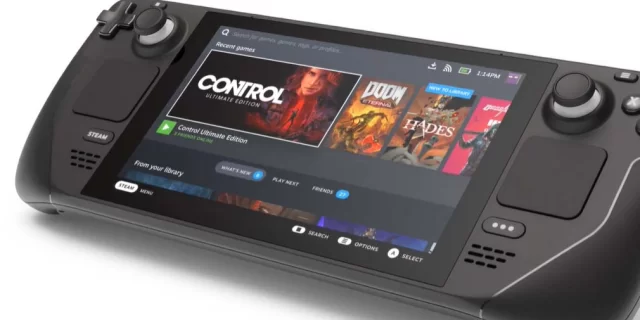Boldly trying to prove that great things come in small packages, the Steam Deck has been making waves in the gaming space for the past few days, stirring up trouble for Nintendo purists and mobile gamers alike. It’s one thing to make headlines, especially given the phenomenal failures of those that came before (it was a valiant effort, Steam Controller), but it’s a whole other thing to actually have lasting value for today’s smarter and pickier gamers.
If you’re unfamiliar with the Steam Deck (the official website can fill you in), it’s essentially a handheld console that lets you play your Steam library with its own built-in custom Linux operating system (called SteamOS), and then some. It’s not the most viable alternative to a legit gaming laptop, but it comes pretty close since you can supposedly play most of the latest AAA games from the device.
Plus, it’s basically a PC, so you can install third-party apps like Windows and even a Nintendo emulator (gasp!).
The major competitor here is the Nintendo Switch - or at least, it seems like it at first glance. There’s simply an unmistakable appeal to the Switch, and it’s dominating the handheld console market for lots of reasons. While Valve wants to position the Steam Deck as more of a PC with a controller attached rather than an actual handheld gaming console, the similarities are uncanny.
Still, the Steam Deck is more of a powerhouse than its Nintendo competitor when it comes to processing power and RAM, with trackpads, extra back and shoulder buttons, and highly coveted Bluetooth support. While the Switch has been plagued by the dreaded “Joy-Con drift” for ages (with no official solution from Nintendo except for users to insert a piece of cardboard in there for a quick remedy), the Steam Deck is pretty confident that it’s solved that pesky little issue.
However, the Switch has a better battery life at 4-9 hours, while the Steam Deck clocks in at just 2-8 hours. The Switch is more lightweight at 0.71 pounds, while its Valve counterpart weighs in at 1.47 pounds. Finally, the Steam Deck is simply more expensive, even if you factor in its three storage options. The base model is priced at $399 for 64GB eMMC internal storage, while the mid-range version will set you back by $529 for 256GB NVMe SSD. The most expensive one has a hefty price tag of $649 for 512GB of NVMe SSD.

Meanwhile, the Switch is priced at a humble $300, with the OLED model - coming October 8th - at only $350 a pop.
As for mobile gamers, is the Steam Deck really going to make a difference in their gaming habits? Is there suddenly going to be a deluge of mobile users shifting to Valve’s brave new venture? While it honestly doesn’t seem like people are just going to abandon their phones in favour of this new tech, the Steam Deck does have its pros over mobile.
For one thing, it lets you play big HD games without the torture of waiting for mobile ports - essentially, you won’t be at the mercy of whether or not the devs will be making a mobile version of your favourite PC game any time soon. For another, it’s a nifty piece of equipment you can show off to your friends or to your followers on IG - after all, adding a new gadget to your gaming arsenal always makes for a pretty good day.
That’s just the thing, though - it’s an extra console you really might not even need, since you can play those HD games on your phone through the cloud, anyway. With Stadia or Xbox Game Pass for Android, you won’t need to lug around the extra weight in your purse. The Steam Deck will definitely struggle with cloud gaming as lots of mobile devices out there have even better specs (not to mention Bluetooth compatibility and better battery life).
Of course, cloud gaming isn’t the best option for those of us in countries with absolutely ghastly internet connections, so the Steam Deck is a win in that respect. Also, mainly because the Steam Deck is a PC in your pocket, it can run the Itch launcher and open up a whole new world of games you otherwise wouldn’t be able to play on your mobile.
Obviously, the main thing to consider here - much like with the Switch - is the price point: are you willing to shell out some extra cash for a console, a better gaming PC, or a mobile device with higher specs? And if the Steam Deck is just a PC, will you constantly have to upgrade it until it eventually ages out?
Personally, I do feel like the Steam Deck will still sell because of its novelty - it’s definitely got something there; I’ll give it that. In the end, it’s not going to encroach on the mobile gaming space at all, I believe - but it all boils down to the choice of games you want to play. Are you a grab-and-go mobile gamer who’s quite happy with your phone as an all-in-one gadget, or do you fancy some dedicated hardware for each of your very specific gaming needs? Are you a hardcore PC gamer, or are you a fan of multiplayer games for the whole family that you can set up on a TV dock?
If the FOMO is hitting you a little harder than usual, the Steam Deck is available for pre-registration on the official website right now ahead of its launch. It was initially supposed to ship out in December, but shipments are now pushed back to Q2 2022 for the basic and mid-range models and Q3 2022 for the 512GB version.
